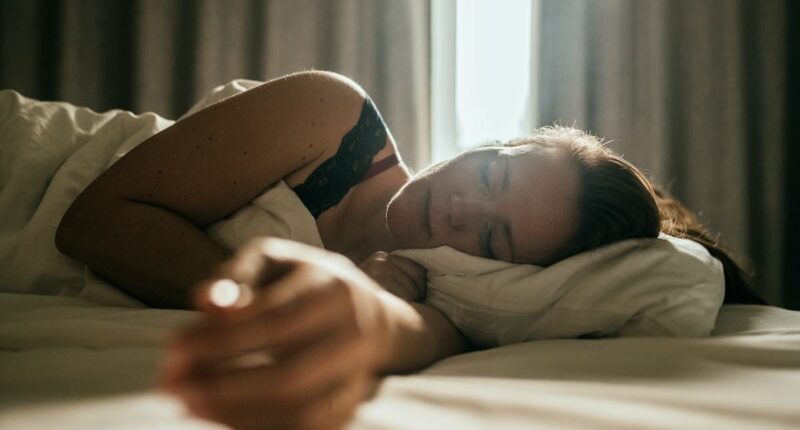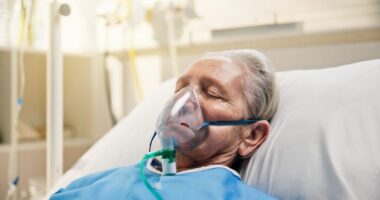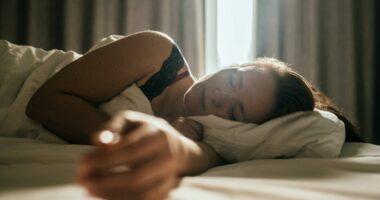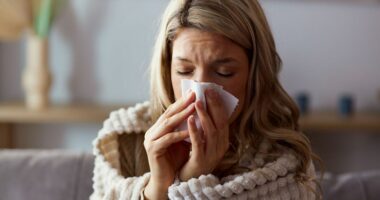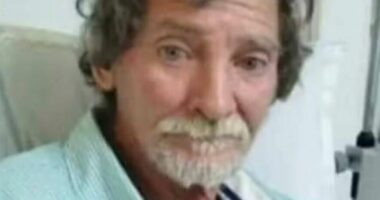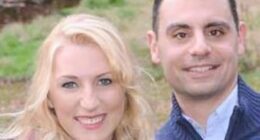Share this @internewscast.com
If you often find yourself yawning during the day or reaching for that fourth cup of coffee, it might be a sign that you’re not getting enough sleep at night.
Consistent lack of sleep has been associated with serious health issues such as kidney and heart disease, high blood pressure, diabetes, and stroke. Additionally, it can negatively affect memory and the ability to absorb new information, which may contribute to dementia.
Interestingly, sleeping too much can be just as harmful as not getting enough rest. Excessive sleep has been linked to heart disease, weight gain, diabetes, cognitive issues, and depression. So, the question is, what is the ideal amount of sleep?
Experts recommend seven to nine hours per night, but one in three adults isn’t getting enough.
During sleep, the brain clears out daily metabolic toxins and transfers short-term memories into long-term storage, solidifying learning.
Lack of adequate rest disrupts essential bodily functions, which explains why ongoing sleep deprivation is closely tied to a higher risk of neurodegenerative diseases like Alzheimer’s.
Sleeping too much could indicate poor sleep quality or an underlying health problem like sleep apnea, depression, brain injury, or another chronic illness, causing the body to require more sleep to recover.
Spending excessive time in bed can also disrupt the body’s natural sleep-wake rhythms, causing a groggy and disoriented feeling upon waking.

Letting yourself go to bed at a reasonable hour and waking up naturally can help you determine the number of hours you need to feel refreshed in the morning (stock image).
Sleep needs change throughout life. Babies require the most, about 12 to 17 hours, while adults generally need less due to full brain development, though sufficient sleep remains essential.
‘Sleep during adulthood is critical for maintaining cognitive function, emotional stability and physical health,’ Dr Leah Kaylor, a licensed clinical psychologist practicing in Virginia, told the Daily Mail.
‘Yet, this is often the stage of life where sleep is most neglected due to work, family responsibilities and social commitments.’
To optimize sleep quickly, aim to wake up at the end of a full sleep cycle, which lasts approximately 90 minutes. Most adults require five to six cycles per night, which translates to 7.5 to nine hours of sleep.
For example, if you need to wake up at 7am, try to be asleep by 11:15pm to complete five full cycles.
Finding your ideal sleep duration may take a few nights of adjustment, but timing your sleep around these cycles can help you wake up feeling more refreshed.
Poor sleep, getting the wrong amount or having a sleep disorder like sleep apnea can shorten a person’s lifetime, with some studies showing it shaves off 4.7 years for women and 2.4 years for men.
Good sleep, according to Dr Sajad Zalzala, chief medical officer of telehealth company AgelessRx, involves at least 120 minutes in REM (the phase of sleep during which dreaming happens), at least 100 minutes in slow-wave sleep (the most restorative phase) and a minimum 90 percent sleep efficiency score (the percentage of total time spent asleep while in bed).
‘If you’re not sure how much sleep you need, start by paying attention to how you feel,’ Dr Kaylor said. ‘Are you waking up refreshed? Or are you relying on caffeine to get through the day?’
Oversleeping has a well-documented association with dementia.
In 2017, researchers at the Framingham Heart Study followed 2,457 older adults with an average age of 72 for a full decade, meticulously tracking their sleep habits and diagnosing cases of dementia.
Participants were grouped based on their self-reported nightly sleep: short sleepers (under six hours), the control group (six to nine hours), and long sleepers (over nine hours).
The team also conducted MRI scans to measure brain volume and administered cognitive tests to get a full picture of neurological health.
While short sleep showed no significant link to dementia, sleeping more than nine hours a night was strongly associated with a higher risk of dementia. Long sleepers were twice as likely to develop the disease over the next decade.

Dr Leah Kaylor (pictured), a licensed clinical psychologist in Virginia, told the Daily Mail that a ‘sleep vacation’ allows you to tune into your body, sleep when it feels right and wake up naturally
MRI scans revealed that long sleep duration was associated with smaller brain volume, indicating accelerated brain aging.
The research suggested that when an individual’s sleep duration increased to over nine hours in the years leading up to the study, it acted as a potent marker of early brain decay, more than doubling their risk of dementia.
While oversleeping can be a symptom of neurological decline, sleeping too little speeds it up.
UK researchers analyzed data from nearly 8,000 people to see if midlife sleep habits influence future dementia risk, not just reflect early symptoms.
They tracked self-reported sleep duration at ages 50, 60, and 70 over a 25-year period. To verify accuracy, some participants also wore sleep-tracking accelerometers, which supported the self-reported trends.
The data revealed that sleeping six hours or fewer per night at the ages of 50 and 60 was associated with a 22 percent and 37 percent increased risk, respectively, of developing dementia later in life compared to those who slept a regular seven hours.

The study also found that the link between short sleep and dementia is not attributable to underlying mental health conditions, suggesting that insufficient sleep itself may be an independent risk factor for cognitive decline decades down the road.
Maintaining proper sleep hygiene could be the key to warding off cognitive decline.
To figure out one’s ideal sleeping time, Dr Zalzala recommends allowing the body two weeks to go to bed and wake up naturally based on its signals, taking what is known as a sleep vacation.
‘When you have the luxury of taking a vacation that isn’t jam-packed with activities, you can really tune into your body,’ Dr Kaylor told the Daily Mail.
‘Without the pressure of an alarm clock, you can let your body fall asleep when it feels right and wake up naturally.’
The basis of sleep vacations is that the body naturally knows how much sleep a person needs.
During the first few days, most people catch up on lost sleep, often experiencing REM rebound, where the brain prioritizes REM sleep to recover from deprivation. This can lead to grogginess for several days.
Then, he added, ‘Once the debt has been paid, natural sleep stabilization and patterns should start to emerge.
![The solid line in this graph depicts the average risk of dying [the Y axis] based on sleep duration [the X axis]. The dash line represents the confidence intervals, which provide a range in which scientists can be sure the true risk of death lies](https://i.dailymail.co.uk/1s/2025/09/05/18/87628411-14415015-The_solid_line_in_this_graph_depicts_the_average_risk_of_dying_t-a-8_1757094279340.jpg)
The solid line in this graph depicts the average risk of dying [the Y axis] based on sleep duration [the X axis]. The dash line represents the confidence intervals, which provide a range in which scientists can be sure the true risk of death lies
‘But then a person should observe these patterns for a few days to pin down the duration of sleep that makes a person feel the best – the more days and therefore data points, the more accurate the picture.’
For a successful sleep vacation, cut out caffeine. It disrupts the body’s internal clock, impairing natural sleep-wake regulation and hormone release.
‘If you can get away with it (which most people can’t) cut out caffeine altogether,’ Dr Kaylor said. ‘The next best option is to reduce caffeine where possible.’
She recommends gradually reducing caffeine intake three to five days ahead of the sleep vacation by cutting down – ideally to one cup of coffee or tea per day, or a maximum of 100 milligrams of caffeine.
‘By reducing or removing caffeine, you’ll allow your body to reset its natural sleep-wake cycle, leading to deeper, more refreshing sleep.’
Not everyone has the luxury of taking a sleep vacation or living life without an alarm clock.
‘The best way to determine your ideal sleep duration is by combining self-experimentation with sleep tracking, monitoring energy levels, and assessing cognitive function.’
To track sleep, Dr Zalzala recommends a wearable sleep tracker such as a Whoop, FitBit, Oura Ring or Apple Watch.
